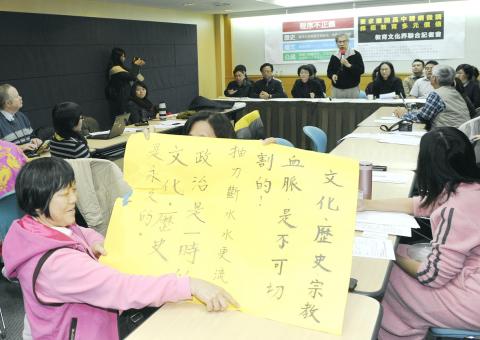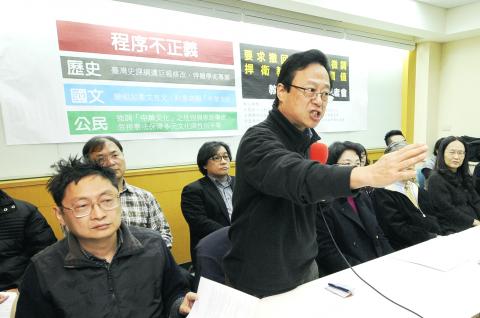More than 30 university professors, high-school teachers, student and civic group representatives yesterday held a press conference to urge the Ministry of Education to drop its proposed “minor adjustments” to high-school history, civics and Chinese-language textbooks.
The textbook controversy shows no sign of winding down as more academics, students and social organizations criticize the ministry, claiming it has abused its authority and broken the law.
The ministry says the adjustments were lawfully proposed to ensure the curriculum “abides by the Constitution,” but academics and teachers said that the ministry’s contention that the procedures were legal and the adjustments are constitutional has not been substantiated.

Photo: Chen Chih-chu, Taipei Times
The essence of the Constitution is to protect the basic rights of the people and set down the framework of a government with its power being regulated and checked, “not provide guidelines for history education,” National Taiwan University history professor Chou Wan-yao (周婉窈) said.
Chang Mao-kuei (張茂桂), a researcher at Academia Sinica’s sociology institute and a former curriculum committee member, said there was no immediate need for adjustments and called for an open debate with the team that proposed the changes.
Civics Teachers Action Alliance representative Huang Yi-chung (黃益中) said the ministry was “trying to mask its arbitrary action by paying lip service to procedure.”

Photo: Chen Chih-chu, Taipei Times
To make a minor change to the curriculum required the proposal to go through the National Academy for Education Research’s Committee of Curriculum Development (CCD) and the ministry’s Curriculum Examining Committee, he said.
The required procedures had been followed at the curriculum development stage, with opinions sought from the working group of curriculum development, the reviewing task force and the Civics and Society Resource Center, as well as through public hearings, Huang said.
“However, the truth is that none of the steps taken were above board,” Huang said. “Working group convener Wang Yin (王垠), who is the principal of National Yilan Senior High School, has said that he did not know about the content of the adjustments until he read about them in a newspaper.”
“At the only meeting with the reviewing task force [none of whom had a professional background in history] that civics teachers attended, Tainan Girls’ Senior High School teacher Chen Cheng-yi (陳正益) said the agenda was set to discuss the proposed adjustments under the premise that the curriculum would be adjusted according to the Constitution,” Huang said.
The Civics and Society Resource Center was telephoned and contacted by e-mail, not through official documents, to send a representative to the task force meetings — and only on the day of the meeting or the day before, he said.
Many teachers said the notice of the public hearing was given too late for them to participate, Huang said, adding that there were documents to back up that assertion.
National Federation of Teachers’ Unions vice president Wu Chung-tai (吳忠泰) said the entire procedure had been unjust.
“Comparing the procedures followed when the math and natural science curricula were adjusted to the way changes to Chinese language and social studies textbooks were made, one cannot help but find the discrepancies suspicious,” Wu said.
A detailed chart provided by Wu shows that proposed changes to the math and natural science curricula were discussed for almost a year, while the discussion period for the Chinese language and social studies changes was three to four months.
While the task force for the math and science changes included high school teachers of those subjects as conveners, the task force reviewing the Chinese language and social studies was made up of “omnipotent, multi-disciplinary” reviewers, Wu said.
This story has been amended since it was first published.

Beijing could eventually see a full amphibious invasion of Taiwan as the only "prudent" way to bring about unification, the US Department of Defense said in a newly released annual report to Congress. The Pentagon's "Annual Report to Congress: Military and Security Developments Involving the People's Republic of China 2025," was in many ways similar to last year’s report but reorganized the analysis of the options China has to take over Taiwan. Generally, according to the report, Chinese leaders view the People's Liberation Army's (PLA) capabilities for a Taiwan campaign as improving, but they remain uncertain about its readiness to successfully seize

Taiwan is getting a day off on Christmas for the first time in 25 years. The change comes after opposition parties passed a law earlier this year to add or restore five public holidays, including Constitution Day, which falls on today, Dec. 25. The day marks the 1947 adoption of the constitution of the Republic of China, as the government in Taipei is formally known. Back then the Chinese Nationalist Party (KMT) governed China from Nanjing. When the KMT, now an opposition party in Taiwan, passed the legislation on holidays, it said that they would help “commemorate the history of national development.” That

Taiwan has overtaken South Korea this year in per capita income for the first time in 23 years, IMF data showed. Per capita income is a nation’s GDP divided by the total population, used to compare average wealth levels across countries. Taiwan also beat Japan this year on per capita income, after surpassing it for the first time last year, US magazine Newsweek reported yesterday. Across Asia, Taiwan ranked fourth for per capita income at US$37,827 this year due to sustained economic growth, the report said. In the top three spots were Singapore, Macau and Hong Kong, it said. South

Snow fell on Yushan (Jade Mountain, 玉山) yesterday morning as a continental cold air mass sent temperatures below freezing on Taiwan’s tallest peak, the Central Weather Administration (CWA) said. Snowflakes were seen on Yushan’s north peak from 6:28am to 6:38am, but they did not fully cover the ground and no accumulation was recorded, the CWA said. As of 7:42am, the lowest temperature recorded across Taiwan was minus-5.5°C at Yushan’s Fengkou observatory and minus-4.7°C at the Yushan observatory, CWA data showed. On Hehuanshan (合歡山) in Nantou County, a low of 1.3°C was recorded at 6:39pm, when ice pellets fell at Songsyue Lodge (松雪樓), a